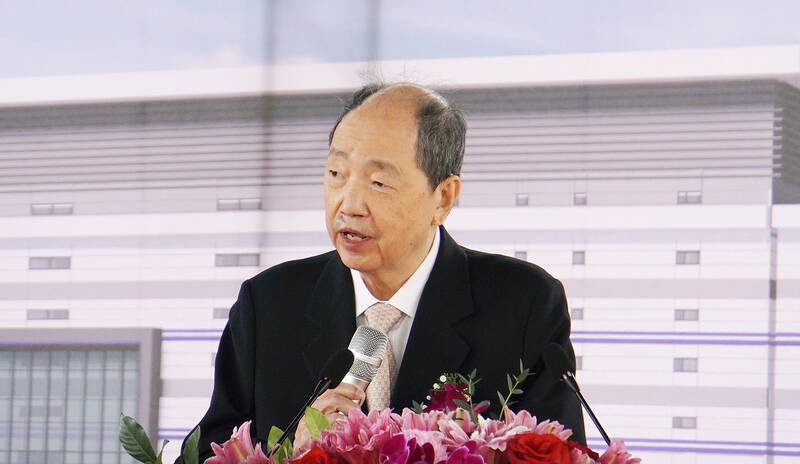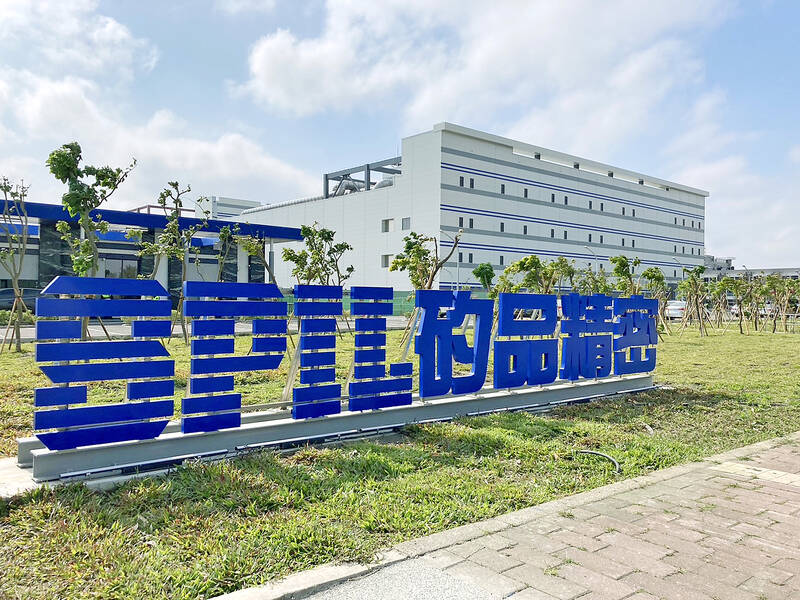Siliconware Precision Industries Co (SPIL, 矽品精密) on Tuesday inaugurated a new factory in Changhua County’s Erlin Township (二林) to meet growing demand for high-end chip testing and packaging services.
SPIL, a subsidiary of ASE Technology Holding Co (日月光投控), said the phase 1 facility is part of the company’s NT$80 billion (US$2.64 billion) capacity expansion program in Erlin over the next eight to 10 years.
The expansion is expected to create 7,000 jobs, it said.

Photo: Yen Hung-chun, Taipei Times
“SPIL continues investing in new factories to get a head start on new growth opportunities,” chairman Tsai Chi-wen (蔡祺文) said, adding that the facility would be “a major step forward in Changhua County’s efforts to encourage semiconductor development.”
Construction of a phase 2 facility would begin soon, Tsai said.
That factory would occupy 14.5 hectares, making it three times larger than its existing plant in the county, SPIL said.

Photo: Yen Hung-chun, Taipei Times
ASE group said it is committed to increasing investment in Taiwan to provide advanced chip testing and packaging services, catering to rising demand for electric vehicles, 5G and high-performance computing-related chips, group chairman Jason Chang (張虔生) said.
The investment also aims to safeguard Taiwan’s leading position in the world’s chip testing and packaging industry, he said.
The nation’s chip industry faces tough challenges and competition in the next 10 years, as countries around the world view semiconductors as a strategically important resource and would heavily subsidize their own buildup, he said.
To protect Taiwan’s competitiveness in semiconductors, Chang said the government should create measures to support recently passed amendments to the Act for Industrial Innovation (產業創新條例).
The amendments stipulate that companies that work to innovate technologies domestically and have a critical role in international supply chains would be granted tax deductions equivalent to the sum of 25 percent of their research and development expenditures and 5 percent of their spending on new equipment acquired for “advanced processes” over a fiscal year.

Application-specific integrated circuit designer Faraday Technology Corp (智原) yesterday said that although revenue this quarter would decline 30 percent from last quarter, it retained its full-year forecast of revenue growth of 100 percent. The company attributed the quarterly drop to a slowdown in customers’ production of chips using Faraday’s advanced packaging technology. The company is still confident about its revenue growth this year, given its strong “design-win” — or the projects it won to help customers design their chips, Faraday president Steve Wang (王國雍) told an online earnings conference. “The design-win this year is better than we expected. We believe we will win

Intel Corp chief executive officer Lip-Bu Tan (陳立武) is expected to meet with Taiwanese suppliers next month in conjunction with the opening of the Computex Taipei trade show, supply chain sources said on Monday. The visit, the first for Tan to Taiwan since assuming his new post last month, would be aimed at enhancing Intel’s ties with suppliers in Taiwan as he attempts to help turn around the struggling US chipmaker, the sources said. Tan is to hold a banquet to celebrate Intel’s 40-year presence in Taiwan before Computex opens on May 20 and invite dozens of Taiwanese suppliers to exchange views

Chizuko Kimura has become the first female sushi chef in the world to win a Michelin star, fulfilling a promise she made to her dying husband to continue his legacy. The 54-year-old Japanese chef regained the Michelin star her late husband, Shunei Kimura, won three years ago for their Sushi Shunei restaurant in Paris. For Shunei Kimura, the star was a dream come true. However, the joy was short-lived. He died from cancer just three months later in June 2022. He was 65. The following year, the restaurant in the heart of Montmartre lost its star rating. Chizuko Kimura insisted that the new star is still down

While China’s leaders use their economic and political might to fight US President Donald Trump’s trade war “to the end,” its army of social media soldiers are embarking on a more humorous campaign online. Trump’s tariff blitz has seen Washington and Beijing impose eye-watering duties on imports from the other, fanning a standoff between the economic superpowers that has sparked global recession fears and sent markets into a tailspin. Trump says his policy is a response to years of being “ripped off” by other countries and aims to bring manufacturing to the US, forcing companies to employ US workers. However, China’s online warriors